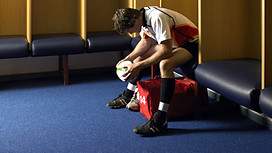Loss, retirement and depression in sport

Loss, Retirement and Depression in sport
Footballers and athletes can experience loss in many ways, loss of form, loss of speed, or loss at not being able to perform through injury or retirement.
The severity of the psychological responses’ are often misunderstood by those involved in sport and to a certain extent by athletes themselves. Research has revealed that after retiring or stopping participation in sport either through injury or retirement, professional and elite level athletes can experience the same psychological stages as individuals who are grieving the loss of a loved one. This holistic research over the last two decades has looked at grief and loss models and typically found that athletes go through similar stages; i) shock / denial; ii) despair; iii) anger; iv) depression; v) pre-occupation and; vi) re-organisation, until the vii) acceptance phase is reached. The acceptance stage still does not mean the athlete is in a happy psychological state, it merely means the athlete has got to a point where there is less emotion involved.
Depression
Of course the magnitude and extent to which an athlete stays in the first four stages depends on the individual. Depression is one of the most difficult stages in the cycle and can vary from being a life long predisposition of low mood state to depressive phases that vary in intensity. Depression is not something that can always be observed in an athlete, it can come on gradually or can be with the person or athlete for many years. The athlete themselves may deal with these symptoms without fully recognising them until trigger points, such as stress, pressure or retirement from the sport can cause the symptoms to surface on a more powerful and negative scale. If an athlete has had low mood levels for years this can provide a trigger point. Stress in itself produces stress hormones, this can lead to chemical imbalances in the brain with too little serotonin present.
Retirement
Retirement from sport is a huge loss for an athlete, most people who completely change occupations do so because they are not enjoying the career they are in, footballers and athletes on the other hand are often forced to retire from a sport they still very much love and enjoy participating in. At some point they are faced with two choices, to retire from the sport or move down the pecking order until retirement at a further date, in both cases they have to deal with loss, rejection and feelings of isolation or separation from team mates, this can lead to depression. That coupled with a possible reduction in exercise can also add to increased depression levels, regular exercise is known to release feel good chemicals such as neurotransmitters and endorphins which are productive in reducing depression and anxiety.
Perceived mental toughness & problems
Athletes by nature are mentally tough and are perceived to be mentally tougher, fitter and healthier than others and this can make it harder for them to approach someone for help, especially if they are in the public eye. It’s important for people to understand that depression can not always be seen and the athlete may never admit to how they feel. It is also much more difficult for men because they are more reluctant to talk about their feelings, they may talk about issues with friends but not how they feel or how they are coping. This is also made more difficult by the social element and stereotypes often associated with male sports, the banter, the feelings of being united and laughter and fun that comes with belonging to a team, along with it brings a sense of identity which can often be lost when the athlete retires from the sport.
Men are sadly three times more likely to commit suicide than women, suicides account for 1 in 100 deaths, a number still far too high…. (View the PDF version of this article here)
Notes to editors: Editors may use quotes and this full article, quotes and the full article must be attributed to Louise Ellis, accredited sports psychologist and performance consultant –louiseellis.com
For a discussion on how Louise can support the athlete from a mind, body and spirit perspective please contact louise@louiseellis.com.
© LE Performance Consulting Ltd 2011. All Rights Reserved






